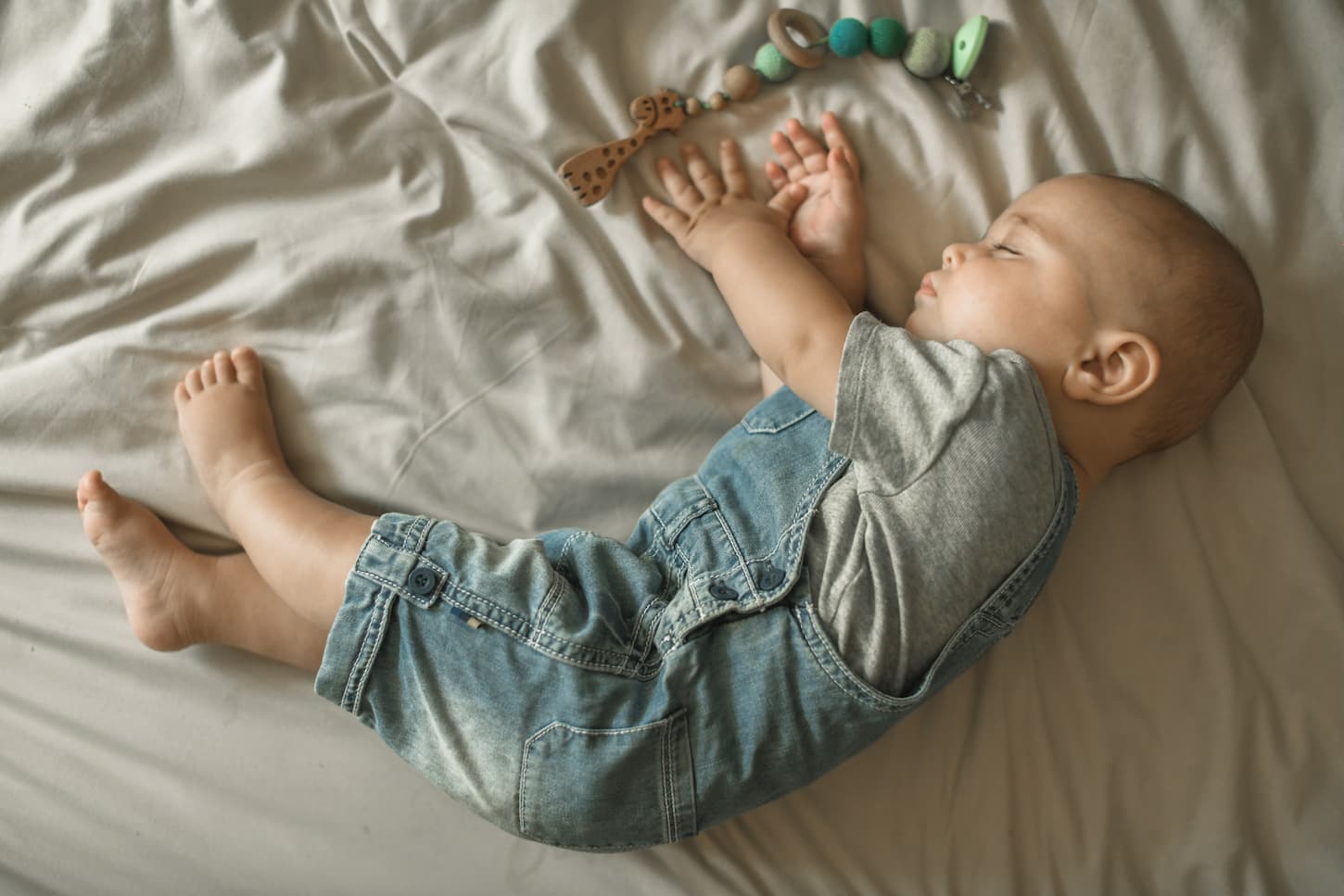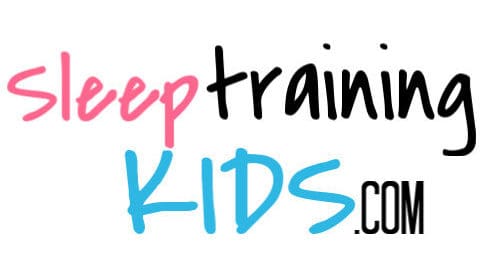Do you miss the time when you and your family could have a perfect night’s sleep? It feels like it has been ages since you experienced it, right? With your fast-growing baby and their ever-shifting sleep patterns (which don’t look like a pattern anymore), it’s easy to wonder if you’ll ever sleep again. It’s also normal to wonder – can you sleep train during a regression?
Parents can still sleep train their baby during a regression or disrupted sleep patterns. In many cases, sleep training during this time will be focusing on healthy sleep habits or using gentler sleep training methods. Methods that involve crying it out may not work as effectively during this time.
Sleep regression happens when a baby is experiencing changes or a growth spurt, wherein they usually have a hard time falling asleep again at night after waking up, or they take shorter naps than usual. This may be a stressful time for the baby as well, which results in their disrupted sleep patterns. However, this phenomenon only lasts for a short time and is pretty common for all babies. Let’s walk you through it.

Should You Sleep Train During a Regression?
Research and personal experience have shown that sleep training can benefit a baby, and their parents, and help to ease or shorten the regression a baby is experiencing. Sleep training a baby during a regression is by no means required, but it is helpful for many families.
The first main regression that babies have is at about 4 months old, or 10 to 12 weeks old. This happens with normal brain development because babies are naturally developing their circadian rhythm.
In other words, this regression is a normal part of a baby’s development. It’s expected, although it doesn’t negatively impact all babies. There are some babies that sail right through this period!
However, this regression does impact a lot of babies, so please don’t feel bad if your baby’s sleep patterns changed drastically at this age. Their little brains are growing up, and their sleep is maturing from a newborn’s sleep to match the sleep patterns of adults’ brains.
That’s not to say they’ll sleep like adults just yet. That can take some time, depending on your baby’s personality, your family life, and a host of other factors.
In my own experience, 10 to 12 weeks old was when the most profound sleep pattern affected all four of my own children. Pretty much, it sucked.
How Do You Sleep Train During Regression?
During a regression, sleep training methods can be used to help teach a baby (and their parents) how to have healthy sleep habits. The methods used can vary from gentle to cry-it-out and can be selected based on the parents’ preferred method.
During a regression, sleep training can be a little bit difficult for some parents as it sometimes depends on the baby. But don’t worry! Here are some tips and methods on how you can walk through your baby’s sleep regression while also sleep training.
Tip #1: Feed your baby during the day
While in a regression, babies tend to be so distracted or they easily lose their focus while eating. You may limit distractions by creating an environment plainer or somewhat “dull” or you can just keep everything away from your baby’s sight that you think might make them lose their focus while eating. You can turn off the television or turn off any music.
Feeding your baby well during the day ensures that your baby will not wake up in the middle of the night crying because of hunger. In addition to that, when your baby wakes up crying, avoid feeding them as they might expect you to make this response every time they cry when waking up.
Tip #2: Create a good bedtime routine
From a bath, changing into their pajamas, reading your baby some bedtime stories, or singing them a lullaby to sleep, are bedtime routines you should do to your baby while sleep training during a regression.
Furthermore, following these routines every single day will help the baby to learn that these adjustments are now part of their day which also helps the baby to understand that these activities are for them to get ready for bed.
Tip #3: Have a dark sleeping area
Just like us adults, babies also need to have a dark bedroom in order to have a good night’s sleep. Having a dark bedroom makes a baby sleep better since there are no lights that could make sleeping a difficult thing to do.
During a regression, any light source can disturb a baby’s sleep. In addition to that, make sure to surround your baby with a natural source of light in order to have a normal sleep cycle when your baby wakes up.
Tip #5: Be flexible while sleep training
It is really important that you need to be flexible with your baby’s sleep regression even while following the routines every day. To ensure that your baby’s regression reduces while sleep training, you also need to know that you need to adjust to your baby’s disrupted sleeping patterns.
In addition to that, your baby is growing and is learning new skills by the day. And being there to support and show your affection to them can really lessen the stress that both of you are experiencing.
Method #1: Sleep train using the gentle method of your choice
There are a lot of gentler sleep training methods. Some are low-cry while others are no-cry (no tears). The exact method you use will depend on your preferred parenting methods, the age of your child, and what methods you’re comfortable using.
Please don’t let anyone else shame you for using the method that you prefer, or for using the method that works. You are your child’s advocate, parent, and expert. Parent them to the best of your ability, and things will (eventually) work out.
We used various gentle sleep training methods with our children until they were about 6 or 7 months old.
Method #2: Sleep train using a cry-it-out method
Earlier, I said that cry-it-out methods don’t work as well during a regression, but they can work during some regressions. I wouldn’t recommend using cry-it-out during the 10- to 12-week-old regression, for example. Most cry-it-out methods don’t work until a baby is at least 6 to 8 months old.
However, if your 12-month-old is having a regression, and nothing else has helped? Then a cry-it-out sleep training session could benefit your family. If nothing else has helped, then it’s at least worth considering, right?
Now, this method says the name for itself. It involves a lot of crying. But, this method for sleep training your baby is usually the easiest which also lets your baby soothe themselves back to sleep without you helping them. It’ll just take a few tears to get there.
A lot of parents are a big fan of this method since rocking the baby to sleep when they are crying will only lead to them being dependent on the parent to help them get back to sleep whenever they suddenly wake up because of some noise.
This method may be a real challenge since hearing a baby cry is the last thing you want to hear, right? However, when the baby finally learns how to sleep by themselves, everyone can benefit from it.
As our children reached 7, 8, or even 12 months, that’s when they were old enough (and ready) to do any crying it out. Even then, we do try to limit the number of tears. We just want them to sleep, not vomit.

How Do You Know When Your Baby is Ready for Sleep Training?
Babies are ready to sleep train using different methods at different ages. Training by focusing on healthy sleep habits can be done from birth, while the Ferber method and other cry-it-out methods work best after 6 months old.
It is really important to know if your baby is ready for sleep training before rushing them to practice it. And while you can’t just directly guess when to start sleep training your baby, here are a few signs that show if they are ready for it or not.
Even so, here are the general guidelines for “formal” sleep training, where you’re following a method.
#1 – Baby should be at least 4 months old
This is one of the important factors that indicate if your baby is ready for sleep training. Newborn babies are still not developmentally ready. You just can’t expect them to sleep through the night without feeding or teaching them to self-soothe their way back to sleep.
Their circadian rhythm is just starting to develop at 10-12 weeks old, they have longer sleep cycles, their feeding schedules are being created, and so much more. Wait until your baby gets to 4 months old, and by then, you can start your baby with his/her sleep training.
#2 – The child should have an independent space for sleeping
Sleeping in the same bed with your baby is a really impossible task when sleep training. Let your baby sleep in their own crib or a bassinet so that they will not sleep every night trying to find their parent’s warmth.
#3 – Your baby shows signs of self-soothing
If you notice that your baby self-soothes on their way back to sleep, then it is time that your baby is ready and capable of sleep training. Although it may take some time for your baby to get the hang of it, always be there ready to help and guide them throughout his/her journey.
#4 – Steady weight gain and growth
The process of sleep training includes helping your baby to have a deeper sleep by getting rid of night feedings. There are some babies aged 4 to 6 months old that still need to receive calories at night to help them grow. But you also need to remember that just because your baby finished a whole bottle of milk during the night, it doesn’t mean that they needed it.
With nursing babies, this can be harder to gauge, as so many of them love to nurse through the night as a comfort mechanism. If this is the case, or if you’ve got to nurse them for your own comfort, that’s fine. It may take both of you time to adjust to focusing on purely daytime feeds.
When Should You Not Sleep Train?
Do not sleep train a baby if they aren’t ready if they are too young for the method if they are sick or teething, or when there is a significant life change (like a new sibling is born). These times should be spent focusing on healthy sleep habits rather than formal sleep training.
One of the most common reasons why parents fail at sleep training their children is because of the timing. It is one of the things that parents usually miss out on. And if you start early for sleep training your baby, you are expected to fail. Here are some examples of when you should not sleep train your baby.
Before the age of 4 months old
Newly born babies are still developing physically and mentally. And if you just directly sleep train your baby without considering his/her capabilities or if your baby is ready, then you will start to notice that there hasn’t been any change since you started sleep training your baby.
When your baby is teething or is suffering from cold
When your baby is suffering from a cold or is teething, it is best that you should refrain from sleep training them. You don’t want them to feel heavily stressed with all those headaches or toothaches, right? Be sure to take care of your baby well during this phase.
When a new sibling is born
Sleep training your baby, when a new sibling is born, is a big no-no. This is because you, as a parent, may lose focus on either of your children, causing them to feel left out. It is better to finish sleep training your first child before planning on having a new baby, for the reason that you won’t need to worry about the other one with his/her sleep regressions as well as your other child.
Can I Sleep Train During 8-Month Sleep Regression?
Babies can sleep train at 8 months old during a regression. Although pediatricians recommend sleep training your baby as early as 4 to 6 months old, it is still perfectly fine to sleep train your baby during an 8-month sleep regression. Many babies will need multiple, formal sleep training sessions.
Don’t worry about your baby being too old to sleep train at 8 months since babies at that age are now capable and are developmentally ready to self-soothe. However, it might be a little difficult since your baby might have gotten used to their new daily routines before starting the sleep training.
In fact, even if your baby sleep trained earlier, they may need a “refresher” course at 8 months old. They may need another one at a year old. That’s okay. Keep focusing on healthy sleep habits, and feel free to use the sleep training method of your choice. That way, everyone can develop healthy sleep patterns!

Key Takeaways and Next Steps
Sleep training your little one is never an easy task. Just be patient and support your child with all the love and affection, and you will surely get through this tough time. Furthermore, your baby’s regression is just a temporary event that usually happens to all babies.
You can try out the methods listed above. And if any of these methods are not your cup of tea, then you can always opt for a different method that will surely suit you and your baby’s taste.
And if you need help figuring out which method to choose going forward? Read this guide: Best Sleep Training Methods for Babies Under 6 Months. It says for under 6 months, but it can help most parents figure out which method is right for them. Good luck!
Resources
Learning about parenting or sleep training techniques is important to learn from various reputable sources. These are the sources used in this article and our research to be more informed as parents.
- Canapari, Craig. “When Not To Sleep Train.” Dr. Craig Canapari, 7 July 2014, https://drcraigcanapari.com/when-not-to-sleep-train/.
- Gorton, Rachel. “Five signs that your child is ready to start sleep training.” My Sweet Sleeper, https://www.mysweetsleeper.com/blog/five-signs-that-your-child-may-be-ready-to-start-sleep-training.
- Liman, Stacy. “4 Month Sleep Regression: Everything To Do.” Early Bird, 6 Oct. 2021, https://amerisleep.com/blog/4-month-sleep-regression/.
- Pelly, Julia. “Why Won’t They Sleep? Dealing with the 8-Month Sleep Regression.” Healthline, 14 Oct. 2019, https://www.healthline.com/health/baby/8-month-sleep-regression.
- Taylor, Marygrace. “Your 9-Month-Old’s Sleep Schedule.” What to Expect, 11 June 2020, https://www.whattoexpect.com/first-year/sleep/9-month-old-sleep-schedule/#tips.
